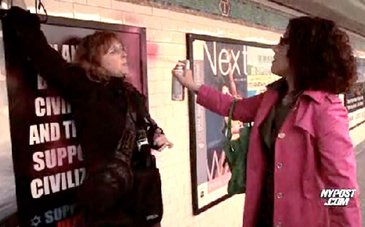In Wake Of Anti-Muslim Ads, MTA Changes Advertising Standards
Sept. 28, 2012, 10:05 a.m.
The MTA has amended its standards to prohibit ads that "would incite or provoke violence or other immediate breach of the peace."

In an attempt to deal with future hatemongering advertisements like the ones currently appearing in subway stations, the MTA yesterday amended the standards that govern what advertising it will accept. During a bizarre meeting in which macho MTA CEO Joe Lhota urged a board member to "be a man," the board voted 8-0 to prohibit ads that "would incite or provoke violence or other immediate breach of the peace, and so harm, disrupt, or interfere with safe, efficient, and orderly transit operations."
Despite incidents of vandalism, the current ads, which equate Muslims with "savages," will not be taken down under the new rules. The MTA had initially rejected the ads because of their “demeaning” language, but the virulent Islamaphobe who paid for them, Pamela Geller, successfully took the MTA to court, winning on First Amendment grounds. By changing the guidelines to focus on ads that could spark violence or "breach the peace," the MTA seems poised to use a different tactic in any future lawsuits—one that the authority hopes will withstand any lawsuit on First Amendment grounds.
The MTA is also requiring ads that contain political, religious or moral expressions to feature a "conspicuous legend" stating it is a paid ad, "identifying the ad sponsor(s) and noting that its posting does not constitute an endorsement by the MTA." The disclaimer reads thus: "This is a paid advertisement sponsored by [Sponsor]. The display of this advertisement does not imply MTA’s endorsement of any views expressed." In a statement, the MTA also left the door open for further restrictions as the situation warrants:
To be clear, the MTA does not believe the First Amendment compels the MTA to open up its ad spaces in this way to a wide range of expressive communications. MTA could, for example, adopt a narrower commercially oriented ad policy, one that limited the range of ads it will display to those selling a product or service, and by doing so, avoid having to run demeaning or divisive ads such as the AFDI ad that resulted in litigation.
But the MTA for decades has permitted its ad spaces to serve a broader communicative function than mere commercial advertising, and the Board, today reaffirms that tradition of tolerating a wide spectrum of types of ads, including ads that express views on a wide range of public matters.
With that choice also come First Amendment limitations that constrain the MTA’s ability to disallow particular ads because their messages are uncivil or divisive. We had thought this did not mean having to run divisive ads that demeaned others, but the recent litigation tells us otherwise.
According to the Times, Geller spoke at the meeting but "was repeatedly shouted down." She urged the board not to change its ad policy, saying, "Have the courage of your convictions, even if the judge imposed it.” In other words, BE A MAN.
The Straphangers Campaign also weighed in on the ads, commending the MTA for adopting "a responsible approach respecting free speech." In 2000, the transit advocacy group tried to run ads with the caption "With livestock it's called animal cruelty. With people it's called a morning commuter," and the ad listed sponsors, including the Transport Workers Union Local 100. But the MTA rejected the ads, arguing they "would be harmful to the morale of transit workers." After an NYCLU lawsuit, the MTA caved and let the ads go up.
So if you're considering blowing your Christmas bonus on some ads showing Obama tossing Muhammad's salad, here are the new standards: